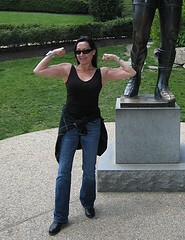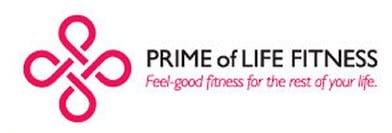“Fitness” has many definitions and there’s no single, established threshold of fitness. In fact, athletic fitness involves many different components, from endurance and agility to power and speed. As we age, though, most of us think about fitness in terms of our overall wellness and our ability to manage the activities of daily living: buying groceries, keeping the house and yard tidy, playing with the grandchildren.
 At Prime of Life Fitness, we think exercise for older adults should begin with a foundation of four key elements: Endurance (both cardio/respiratory and muscular), Strength, Balance, and Flexibility. Let’s look at each element in a little more detail.
At Prime of Life Fitness, we think exercise for older adults should begin with a foundation of four key elements: Endurance (both cardio/respiratory and muscular), Strength, Balance, and Flexibility. Let’s look at each element in a little more detail.
Endurance is your body’s ability to keep working over time. It involves both your heart and lungs delivering oxygen to your cells and your metabolic system’s ability to store, deliver and use energy efficiently over time. We talk about both cardio/respiratory endurance (how long you can maintain a walk, run or bike ride at a given pace) and muscular endurance (how many times you can lift a certain weight with good form).
In terms of your daily life, think of cardio endurance as your ability to keep up with your grandkids on a bike ride, and think of muscular endurance as your ability to lift and carry all the plants and landscaping materials for your big garden beautification project.
Strength refers to your muscles’ ability to apply force. Think lifting, pushing, pulling—these are all force-generating actions. You build strength by gradually increasing the amount of resistance or weight your muscles can overcome.
Strength training is especially important for older adults, because if we’re not actively challenging our muscles, we can expect to lose 4-6 pounds of muscle each decade. Muscular strength can mean the difference between being able to carry a gallon of milk or only a quart, being able to pull the trash can to the curb or having to ask the neighbor for help.
Flexibility is your ability to achieve a full range of motion at a joint. Many of us ignored our flexibility training in our younger years, and we’re paying for it as we get older. Our bodies naturally become less flexible over time, but more flexibility means more protection from injury.
Think about a dried up, stiff rubber band vs. a new, stretchy one. Which is more likely to snap and break? Your muscles, tendons and ligaments are like that rubber band; the stiffer they are, the more likely they are to be injured. If you’ve ever had trouble zipping your dress, reaching an overhead shelf or bending down to tie your shoe, you know how important flexibility is to your daily life.
Balance is your ability to control your body’s center of gravity in relation to your base of support—or, more simply, your ability to keep from falling over! One reason for the dramatic increase in broken bones as we age isn’t just decreased bone density; it’s our loss of balance. Your bones are less likely to break if you aren’t falling down.
Like every other aspect of fitness, balance can be practiced, trained and improved with a little dedicated effort. Balance is closely tied to strength, because it’s our muscle control that helps us maintain our balance during motion.
If your current workout doesn’t include all four pillars of fitness, you may be doing yourself a disservice as you approach your golden years. A fitness program that includes elements of endurance, strength, balance and flexibility will help you live a fuller, richer life, and you’ll feel better doing it.
photo credit: Neeta Lind.

